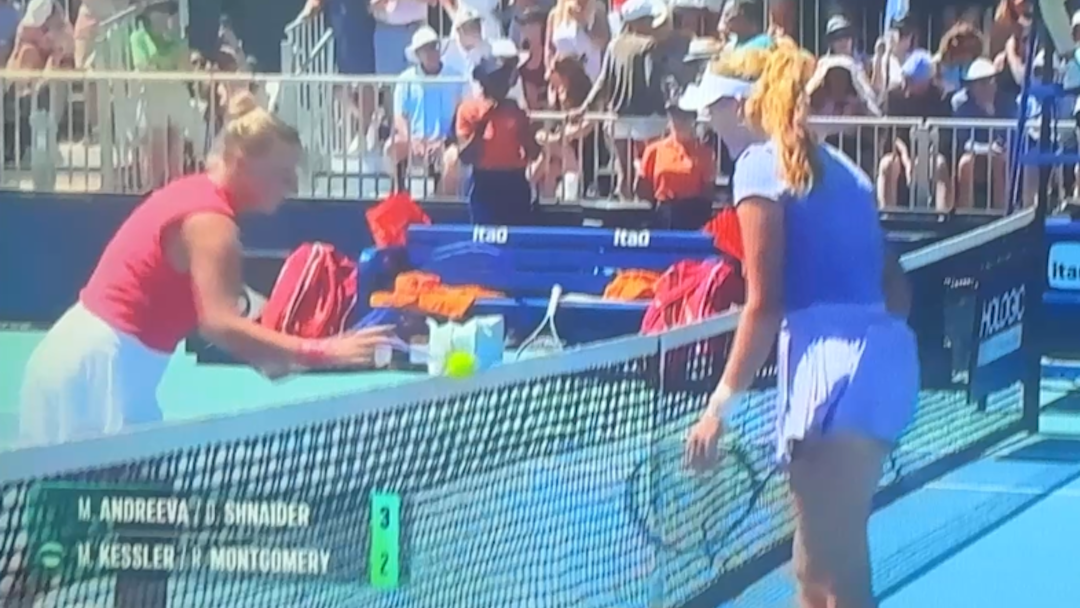USTA League coordinators often face difficult decisions when rain disrupts local league playoffs. There is rarely a perfect solution in these moments as they try to find the “least bad” option. The complexity of contingency planning in these situations is compounded by the constrained court availability, imminent deadlines for certifying teams that advance to the next tier of Championships, and competing interests of multiple teams. As rain falls, coordinators must navigate a storm of tough calls, knowing that any choice will inevitably leave some players and teams dissatisfied.
Rain disrupted the final day of the 2024 Dallas Tennis Association (DTA) 18+ City Championships. In the men’s 4.0 division, two undefeated teams met head-to-head in what was effectively the “finals” of a four-team round-robin pool. The winner of that matchup would advance directly to the Sectional Championships a couple of weeks later. The tight scheduling between the end of the DTA playoffs and Sectionals also creates immense pressure to declare completion.
Consequently, both captains and the DTA local league coordinator were understandably motivated to get the matches played. Last weekend, “A Tale of Contingency Provisions in the Captain’s Letter” described the options for shortening play, along with a disclaimer that the DTA reserves the right to alter play beyond the parameters outlined in the Captain’s letter for the event.
The Local League Regulations for the DTA also contain a rule declaring that 8-game Pro-Sets will be used in response to weather or other unforeseen circumstances. However, additional language stipulates that other appropriate scoring formats can be selected. That regulation was reprinted verbatim in the Captain’s letter for these playoffs. This is arguably the most official of the rain contingency provisions outlined in that document.
7O. When weather or unforeseen circumstances force the DTA League Coordinator to use an alternate scoring format during a local championship event (i.e. League Play Off, City Championship and Weekend Events), Dallas will utilize an 8-game Pro-Set with Ad scoring. If faced with time constraints, the DTA League Coordinator and VP of Leagues will determine the appropriate scoring format, which could include a shorter format.
USTA Local League Rules & Regulations, Dallas Tennis Association, for USTA Championship Year 2024.
Examining the playoff results online, it is evident that one of the contingency decisions made by the DTA eliminated team matchups that mathematically had no bearing on the final standings. For example, the two winless teams in the Men’s 4.0 division did not play their final match as scheduled. However, for the men’s matches completed on Sunday, not a single one recorded a score that reflected a Pro-Set. In fact, it appears that all the matches played that day used the de facto USTA League standard format of two out of three sets, ad scoring, with a super-breaker in lieu of the 3rd set.
However, in the men’s 4.0 matchup between the two undefeated teams, a highly unusual decision was made to eliminate the two singles lines and decide advancement based solely on the doubles. Ironically, one potential driver for that decision is that the two teams collaboratively scrambled to secure three indoor courts at another local facility. While five courts would have been ideal, three was all there was to be had that rainy Sunday afternoon.
Here is where things get more than a little murky. This speculative version of the story assumes that all stakeholders acted with good faith and intent, but a colossal communication disconnect occurred. Both captains were highly motivated to get the matches played but for different reasons. One had what appeared to be a much stronger team on paper and thus wanted to avoid a lottery draw for that reason. The other captain wanted to play in the interest of the good sportsmanship principles of the sport but also because he thought his team might be able to pull off the upset.
The lineups had been exchanged, and the singles lines were on court warming up when the rain came. At that juncture, the captain of the “weaker” team thought his team had a good shot to carry the two singles lines, which would create pressure on all three of the other team’s doubles lines to hold up their end of the sweep. On the other hand, the captain of the stronger team believed that his team would win the three doubles lines easily, rendering the singles lines irrelevant.
Somehow, one of the captains and the DTA coordinator seemed to conclude that the “smartest” way to handle the situation was to play only the doubles lines and eliminate the singles. Unfortunately, the other captain was not on board with that idea and wanted all five lines to be played. To compound the situation, as he protested the decision, it probably appeared to the DTA coordinator that he had reneged on the agreement that he never made.
As a casual aside, the losing captain was told that playing lines later in the week wasn’t an option due to imminent deadlines for certifying the teams advancing to Sectionals. Paradoxically, the men’s 3.5 divisions were allowed to play matches the following week, and the dates when those matches occurred were recorded in TennisLink. Playing the matches later in the week was demonstrably a viable option.
When I first noticed that inconsistency, I assumed it was because the deadline for certifying teams was earlier for the 4.0s than for the 3.5s. In Texas, the 18+ Sectionals are played across two weekends, one with all the .0’s divisions and the other with the .5s. However, the weekend for the 3.5s was earlier than the one for the 4.0s this year. It makes no sense for the 3.5s to be able to extend the schedule but to deny that option to the 4.0 team that had an extra week of leeway.
This episode is an object lesson for USTA playoff and championship coordinators: When one captain presents an innovative solution for completing the matchup and gives the impression that the other captain agrees, that must be positively verified. Once again, rather than assuming negative intent, this version of the story is that the captain was too wrapped up in his own perspective to see that his smart and obvious solution wasn’t in the best interest of the other team.
While the losing team’s captain was willing to play the matches to avoid a lottery draw, his decision was based on the assumption that all the lines would be played, giving him the best chance to prevail. When the lines were truncated in a way that put his team at a disadvantage, he might have preferred the lottery. I doubt the winning captain would have been enthused about playing only three lines if two singles and one doubles line were played because that would have put his stronger team at a disadvantage.
Second-guessing shortened format decisions is a rain-soaked slippery slope. Both captains were highly gracious in responding to my questions about the situation. Without the third perspective from the DTA League Coordinator, I can only speculate that it was a choice made under immense pressure and likely incomplete information. This is truly a “damned if you do, damned if you don’t” situation. In the absence of playing all five lines, someone was going to be unhappy.
Looking ahead to tomorrow’s post, I have some thoughts on increasing transparency that supports the perception of fairness when making difficult decisions involving eliminating lines as a contingency. That being said, it is an unusual option that I think should be avoided if at all possible.
- USTA Local League Rules & Regulations, Dallas Tennis Association, for USTA Championship Year 2024.



